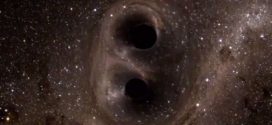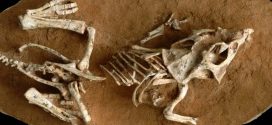Scientists have discovered a cosmic one-two punch unlike any ever seen before. Two of the most powerful phenomena in the Universe, a supermassive black hole, and the collision of giant galaxy clusters, have combined to create a stupendous cosmic particle accelerator. By combining data from NASA’s Chandra X-ray Observatory, the Giant Metrewave Radio Telescope (GMRT) in India, the NSF’s Karl …
Read More »Science
Research Looks Into Your Chances Of Surviving A Zombie Apocalypse
A UK study has determined humanity would only survive for 100 days in the event of a zombie apocalypse, but we could fight back. Physics students from the University of Leicester, in central England, hypothesised a zombie would likely find at least one person a day to turn, leaving a mere 300 people uninfected on Earth after only 100 days. …
Read More »British tourist gets very close to great white shark (Watch)
A tourist has captured the amazing moment a huge Great White shark breached the water in pursuit of a tasty treat. Spectacular pictures and video show the 13-foot-long, 1700-pound predator leaping out of the water as it latches onto a decoy seal. Passengers on board the vessel video the encounter as the shark continues to circle horrifyingly close. The spectacular …
Read More »Arctic area pollutants threatening polar bear, finds new research
The future of the polar bear is under threat from dangerous chemicals polluting the Arctic ecosystem. Environmental regulations that came into force decades ago are reducing some toxic Persistent Organic Pollutants (POPs) in the Arctic, but others are on the rise to take their place as regulations fail to keep pace with chemical manufacturers. A study published in the journal …
Read More »Total Solar Eclipse August 21, 2017: Where and How to See It
On August 21, 2017 a total eclipse of the sun will be visible from within a narrow corridor that traverses the United States. The total solar eclipse of August 21 is the first total eclipse visible from America’s lower 48 states in over 38 years. The last one happened in 1979 and passed through the Pacific Northwest and central Canada …
Read More »Fast radio bursts now a bit less mysterious – But What Is It?
Fast radio bursts in space have confused the astronomy community for years. What causes them, and where do they come from? At last, researchers are getting some answers. For the first time, scientists have traced one of these bursts back to its home galaxy. Rare but powerful bursts of radio waves that have puzzled astronomers for years have now been …
Read More »NASA Announces New Space Mission To Study Black Holes
NASA will embark on a new mission to explore supermassive black holes, neutron stars, and pulsars hidden within the depths of space. The Imaging X-ray Polarimetry Explorer, or IXPE, will launch in 2020, and will use three specialized space telescopes to conduct its business. “Objects such as black holes can heat surrounding gases to more than a million degrees,” a …
Read More »Brain and tooth size didn’t co-evolve in humans, Says New Study
A new research reveals there is no link in the evolution of brain and tooth size. Published today in Proceedings of the National Academy of Sciences, the research compared brain size evolution with reduced tooth size rates in eight hominin species: two australopiths (A. africanus and A. afarensis, roughly 1.9-2.9 million years old), two members of Paranthropus (P. robustus and …
Read More »Gigantic Comet will be visible from earth till 14 January
According to NASA, a rare comet that researchers have discovered will be visible from earth. According to a press release from the Jet Propulsion Laboratory, NASA actually has its eye on two newly discovered comets at the moment. But the one we care about at this exact moment is called Comet C/2016 U1 NEOWISE, and the reason we care is …
Read More »Granny the killer whale dies at 105; researchers say
The world’s oldest known killer whale – J2, or affectionately known as “Granny” — is missing and presumed dead. Ken Balcomb with the Center for Whale Research says in a statement that “Granny” is missing and is presumed dead. Balcomb writes that it’s believed Granny had been seen thousands of times over the last 40 years and most recently had …
Read More »Some dinosaur eggs took three to six months to hatch, finds new research
Scientists at Florida State University have discovered that some dinosaurs took months to hatch from their eggs, a factor that may have contributed to their extinction. In an article in the Proceedings of the National Academy of Science, FSU Professor of Biological Science Gregory Erickson and a team of researchers break down the complicated biology of these prehistoric creatures and …
Read More » Canada Journal – News of the World Articles and videos to bring you the biggest Canadian news stories from across the country every day
Canada Journal – News of the World Articles and videos to bring you the biggest Canadian news stories from across the country every day










